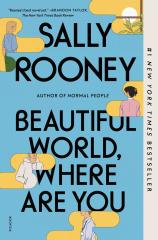Beautiful World, Where Are You
Review
Beautiful World, Where Are You
Eileen and Simon and Felix and Alice. They’re the quartet of Irish young adults whose lives and loves provide the subject matter of Sally Rooney’s reflective third novel, BEAUTIFUL WORLD, WHERE ARE YOU. And while there are those who might have feared that Rooney had mined that lode to exhaustion after her critically lauded and popular books CONVERSATIONS WITH FRIENDS and NORMAL PEOPLE, her latest only serves to confirm her estimable talent and prove them wrong.
At the heart of the story is the intimate friendship, forged in their days at university, of Alice Kelleher, a novelist whose writing has brought her considerable attention, not all of it desired, and financial security flowing from a lucrative book deal she signed at 24, and Eileen Lydon, who works as an editorial assistant at a literary magazine in Dublin. On the cusp of turning 30, the two young women don’t seem to be professional rivals in any true sense, but the tension that flows from Alice’s prodigious early success and Eileen’s modest circumstances is palpable.
"Rooney is an expert guide to the geometry of these relationships, carefully tracing their waxing and waning over time, and is especially well-attuned to how they manifest the delayed adulthood of her fellow Millennials."
Alice, who has spent time in a psychiatric hospital after a breakdown, lives alone in a converted rectory on the Irish coast and worries that she has “forgotten how to conduct social intercourse.” It’s there that she connects on Tinder to Felix Brady, who despises his job filling orders at a local warehouse. He struggles with drinking, alludes to some dubious aspects of his past, and professes little interest in Alice’s literary accomplishments. But after an unpromising first date, she invites him to accompany her on a trip to Rome to promote her books. Their improbable relationship takes root, albeit in fairly rocky soil.
Eileen’s romantic foil is Simon Costigan, who has known her since her birth and now works as an advisor to a left-wing parliamentary group. He’s only five years older than Eileen, but it seems he’s clearly the most mature member of the quartet, at times appearing almost as a fatherly figure. Simon is also a practicing Catholic, a status that places him at odds with the skepticism, if not outright hostility to religion, of the other characters.
Rooney is an expert guide to the geometry of these relationships, carefully tracing their waxing and waning over time, and is especially well-attuned to how they manifest the delayed adulthood of her fellow Millennials. “People our age used to get married and have children and conduct love affairs,” Alice observes in an email to Eileen, “and now everyone is still single at thirty and lives with housemates they never see.”
Though their match would make anyone question the algorithms that power online dating apps, Felix’s low regard for Alice’s literary eminence seems to make him even more attractive to her. The progress of Eileen and Simon’s episodic romance is shadowed by his succession of relationships with other women. But through it all, there is undeniable physical and emotional chemistry in these pairings, and Rooney effectively maintains our uncertainty about whether they will flower or wilt.
In addition to conventional narrative, Rooney relies on a technique that seems simultaneously timeless and utterly contemporary. While not truly an epistolary novel, lengthy and erudite email exchanges between Alice and Eileen are central to revealing their concerns and their character. In them, the self-proclaimed Marxists ruminate on subjects that include, in addition to climate change, the evils of capitalism, and the ticking of their biological clocks, Eileen’s belief that “civilisation is presently in its decadent declining phase and that lurid ugliness is the predominant visual feature of modern life,” and Alice’s disdain for the “colossal speed and waste and godlessness of the twentieth century.” But even as they discourse on these weighty subjects, a portrait of their friendship emerges organically.
The emails allow Rooney to vent about the literary world that has elevated her to superstar status before age 30, something she does with biting wit. Alice, on her first date with Felix and in answer to his curiosity about what her books are about, replies, “Oh, I don’t know. People.” She dismisses herself as a “widely despised celebrity novelist” and observes that she can’t read contemporary novels anymore “because I know too many of the people who write them.” When they’re not complaining about “not enough publicity, or bad reviews, or someone else making more money,” she says they’re writing “their sensitive little novels about ‘real life.’ The truth is they know nothing about real life. Most of them haven’t so much as glanced up against the real world in decades.”
Whatever the source of Rooney’s own inspiration, her characters feel undeniably real. No one would characterize her as an experimental novelist, but here she displays a fondness for an unorthodox style that features paragraphs extending for multiple pages in which she embeds extensive conversational exchanges that are both true to life and somehow at a slight, but thoughtful, remove from it. She’s such a lucid writer, however, that there’s no risk of getting lost in what, in the hands of a lesser novelist, might turn into an impenetrable verbal thicket.
It’s been barely four years since CONVERSATIONS WITH FRIENDS appeared. There are promising young novelists whose subsequent works don’t excite the same interest as their debuts. But now, three novels into her career, it’s clear that Sally Rooney’s stature is well-earned. We’ll be looking forward eagerly to her work for years to come.
Reviewed by Harvey Freedenberg on September 17, 2021
Beautiful World, Where Are You
- Publication Date: June 7, 2022
- Genres: Fiction, Women's Fiction
- Paperback: 368 pages
- Publisher: Picador
- ISBN-10: 1250859042
- ISBN-13: 9781250859044




